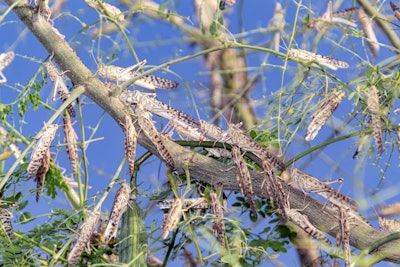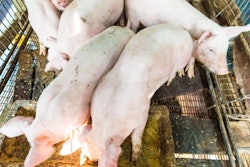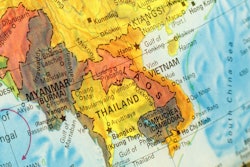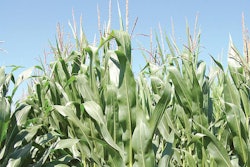
Pakistani pilot programs pays community to catch swarming locusts and feed them to animals
A pilot program and scientific study of locusts in animal feed has demonstrated the potential to turn what was a looming agricultural disaster into potential savings for Pakistani chicken producers.
The pilot program, which began in early March, was the brainchild of Pakistan’s Ministry of National Food Security and Research, and the Pakistan Agricultural Research Council. Faced with some of the worst locust swarms in decades, Johar Ali, a member of the Pakistan Agricultural Research Council’s Animal Sciences Division, said he knew farmers were about to lose their crops. At the same time, he said, he also knew that Pakistan imports some $2 billion in soybeans every year for poultry and fish feed — and he thought of a solution.
“We followed locusts and found out that they lay eggs in sandy humid areas at night and can be easily caught,” Ali said. “We made an announcement in villages and showed them how to catch locusts.”
Villagers could bring the captured locusts to their local authorities to earn PKR20 ($.12 USD) for every kilogram of locusts. According to NGO news service The Third Pole, farmers in the Okara district averaged seven tons of locusts per night, bringing in up to $125 per person per day.
A subsequent trial on chickens showed the locusts had similar benefits in poultry feed as soybeans, according to Ali. So long as the locusts were not contaminated by insecticides — local farmers had to be instructed not to collect dead locusts that could have been sprayed — the locusts consisted of 70% protein on a dry matter basis, making them a better and cheaper source of protein than soybean meal. The project team is following up with a trial on fish feed, Ali said.
Although the pilot project was limited to a single community and relatively short-lived, Ali said the program holds promise on a larger scale.
“Using locusts as a poultry/fish feed ingredient can lower the burdens and will be a good source of income” for Pakistani farmers, he said. “Using locusts will also reduce poultry/fish feed prices, thereby reducing poultry meat prices.”

















